Matthew Scott Holland, the son of Jeffrey R. Holland of the Quorum of the Twelve Apostles of The Church of Jesus Christ of Latter-day Saints and Patricia Terry, was born in 1966 and raised in the Utah Valley where both Utah Valley University and Brigham Young University are located. He graduated from Provo High School in Provo, Utah, and earned the rank of Eagle Scout from the Boy Scouts of America in 1980. He graduated from Brigham Young University with honors in 1991, and was valedictorian for the political science department. Also in 1991, he was awarded the Raoul Wallenberg Scholarship for a year of graduate study at the Hebrew University of Jerusalem. He also holds a master’s degree and Ph.D. in political science from Duke University.
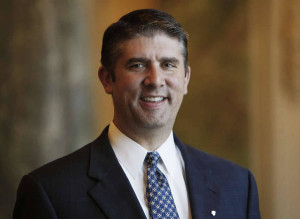 He currently serves as the sixth President of Utah Valley University, a position that he has held since June 2009. His father, Jeffrey R. Holland, served as the ninth President of Brigham Young University. Political science has always been his strong suit, and before coming to Utah Valley University to serve as President, he was an associate professor of political science at Brigham Young University where he taught courses in political philosophy and American political thought. Recently, in honor of the Sesquicentennial of Abraham Lincoln’s Second Inaugural address (4 March 1865), he presented a public discourse.
He currently serves as the sixth President of Utah Valley University, a position that he has held since June 2009. His father, Jeffrey R. Holland, served as the ninth President of Brigham Young University. Political science has always been his strong suit, and before coming to Utah Valley University to serve as President, he was an associate professor of political science at Brigham Young University where he taught courses in political philosophy and American political thought. Recently, in honor of the Sesquicentennial of Abraham Lincoln’s Second Inaugural address (4 March 1865), he presented a public discourse.
“With malice toward none; with charity for all…”
During the course of his remarks, Holland commented:
Lincoln’s second inaugural address, 150 years old today, is as pertinent as ever. It reminds us that we must resist the poisonous temptation to see those with whom we disagree as bitter enemies even as we vigorously defend the moral truths that ought to guide our public life.
One hundred and fifty years ago, on Saturday, 4 March 1865, President Abraham Lincoln stood on the eastern portico of the U.S. Capitol and delivered his Second Inaugural address. His speech which consisted of 703 words has been referred to as a “theologically intense speech” and has been widely acknowledged as one of the most remarkable documents in American history. Holland notes that even Fredrick Douglass, who was not a particular supporter of Lincoln, referred to the speech as a “sacred effort.” It is recorded that the London Spectator said of it,
We cannot read it without a renewed conviction that it is the noblest political document known to history, and should have for the nation and the statesmen he left behind him something of a sacred and almost prophetic character.
Journalist Noah Brooks, who was present at the time of the speech stated that the audience received the speech in “profound silence.” Albeit, he further notes, some passages were acknowledged with cheers and applause, and moist eyes and tearful faces were noticed among the crowd.
Holland pointed out in his remarks that “Lincoln himself acknowledged it was filled with ‘lots of wisdom’ and predicted it would ‘wear as well as—perhaps even better than—anything I have produced.’ It is noted that Brooks further commented:
But chiefly memorable in the mind of those who saw that second inauguration must still remain the tall, pathetic, melancholy figure of the man who, then inducted into office in the midst of the glad acclaim of thousands of people, and illumined by the deceptive brilliance of a March sunburst, was already standing in the shadow of death.
Brooks was referring to Lincoln’s assassination which occurred on the evening of Friday, 14 April 1865, just six short weeks after he had delivered a timely speech which was then considered to be, and has since proven to have been, prophetic in nature.
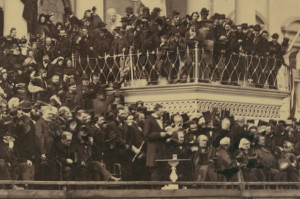 When Lincoln stepped forward to speak on that momentous morning, the gray overcast skies were suddenly illuminated by a brilliant ray of sunshine. Chief Justice Chase, as well as many other spectators, saw it as “an auspicious omen of the dispersion of the clouds of war and the restoration of the clear sunlight of prosperous peace.” Although there were several reasons for such an interpretation including the sense that the Civil War was finally drawing to an end, as Lincoln spoke, he did not appear to be overly optimistic about the future. He concluded his speech that day with these words:
When Lincoln stepped forward to speak on that momentous morning, the gray overcast skies were suddenly illuminated by a brilliant ray of sunshine. Chief Justice Chase, as well as many other spectators, saw it as “an auspicious omen of the dispersion of the clouds of war and the restoration of the clear sunlight of prosperous peace.” Although there were several reasons for such an interpretation including the sense that the Civil War was finally drawing to an end, as Lincoln spoke, he did not appear to be overly optimistic about the future. He concluded his speech that day with these words:
With malice toward none; with charity for all; with firmness in the right, as God gives us to see the right, let us strive on to finish the work we are in; to bind up the nation’s wounds; to care for him who shall have borne the battle, and for his widow, and his orphan–to do all which may achieve and cherish a just and lasting peace, among ourselves, and with all nations.
Holland further notes in his discourse:
Twenty-seven years before this singular moment, in one of his very first speeches as a young, aspiring politician, Lincoln had argued that the greatest threat to the survival of the American republic would never be foreign invasion. Rather, it would come from internal challenges connected to “the deep rooted principle of hate, and the powerful motive of revenge” that so often lurk in our human nature. If ever there was a moment in our history when the acids of hatred and revenge were at a rolling boil, it was 150 years ago today. Never before, or since, has the country come anywhere close to the massive destruction of life, limb, and brotherly love caused by the Civil War. Yet there Lincoln stood, speaking more like a prophet or priest than a political-military leader on a wartime footing, giving voice to a nation that would suppress the very natural response of hatred and revenge in favor of a profound and active love for “all.” Such words in such a situation were without precedent in history.
Lincoln realized that it was Not His War
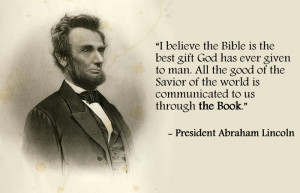 By his extensive reading of scripture and long reflection, Lincoln came to conclude that God was both in control of human affairs and ultimately indecipherable by mere mortals. It is perhaps this view of God’s active role in the affairs of unknowing men that best explains why Lincoln was so resolute and scrupulous to avoid prematurely predicting an end to the Civil War conflict given the facts of 4 March 1865. Lincoln realized that he could not be an arbitrator of a war that was not his to arbitrate. Holland further comments:
By his extensive reading of scripture and long reflection, Lincoln came to conclude that God was both in control of human affairs and ultimately indecipherable by mere mortals. It is perhaps this view of God’s active role in the affairs of unknowing men that best explains why Lincoln was so resolute and scrupulous to avoid prematurely predicting an end to the Civil War conflict given the facts of 4 March 1865. Lincoln realized that he could not be an arbitrator of a war that was not his to arbitrate. Holland further comments:
If the war was, in fact, a punishment to “both North and South” from God for two and half centuries of either practicing or abetting slavery—something the mere human Lincoln could only surmise but not emphatically declare—then it just might be the case that more divine justice was to be exacted and the war would continue.
He further exhorts that although we should love one another, and treat one another with dignity and respect, as Lincoln also believed, we should exercise caution to avoid misreading or misinterpreting what Lincoln was alluding to in his Second Inaugural address, whereby we may inadvertently reduce his timely speech to nothing more than a “crude postmodernism simply spruced up in religious garb.”
Holland continued by saying,
In the very same breath that Lincoln calls forth a supreme spirit of charity for all, he presses the North to act “with firmness in the right, as God gives us to see the right,” striving “to finish the work we are in.” The work, of course, is the work of war—a war that began as an effort to save the Union, but which by Gettysburg had been transformed into an effort to give a “new birth” of liberty to “all men.
By Lincoln’s reckoning, it may have been impossible to know God’s “own purposes” in full, but there was a discernibly right answer in the conflict over slavery. Thus, just as the practice of love was clearly the obligation of those who would follow the God of the Bible, so too was a vigilant defense of the notion that all individuals are, by nature, equals, entitled to rule over themselves and not be ruled by others but by their consent.
Lessons Learned from Lincoln’s Words
It is a certainty that the very fibers that bind the fabric which holds our great nation together are being ripped apart by the malevolent ideologies, cultural discord, and religious indifference that continue to plague our nation like a growing cancer.
However, a careful reading of Lincoln’s immortal words reveals that he was not asking for a complete surrender of a commitment to moral truths, but rather he was emphasizing that moral truths do exist, and if we are to survive as a nation, we must make a concerted effort to understand those moral truths which are the foundation upon which the pillars of our nation rests, and let those moral truths be a beacon to us in our daily living. We must not only stand firm on these truths, but if necessary, we must be prepared to preserve them through the giving of our own lives.
Lincoln’s words also remind us that if we yield to the temptation to merely view those with whom we have disagreements as our mortal enemies, we do so at the risk of putting our nation in jeopardy.
At the close of his First Inaugural address he had declared, “We must not be enemies, but friends.” His sentiments align with the words of the Savior who taught us:
But I say unto you, love your enemies, bless them that curse you, do good to them that hate you, and pray for them which despitefully use you, and persecute you; that ye may be the children of your Father which is in heaven: for he maketh his sun to rise on the evil and on the good, and sendeth rain on the just and on the unjust (Matthew 5:44-45).
Holland concludes his discourse:
If Lincoln was right, then one of the chief tasks for today’s citizens and civic leaders is to see that, while our passionate disagreements over public principles may sometimes strain, they must not be allowed to “break the bonds of our affection.”
About Keith L. Brown
Keith L. Brown is a convert to The Church of Jesus Christ of Latter-day Saints, having been born and raised Baptist. He was studying to be a Baptist minister at the time of his conversion to the LDS faith. He was baptized on 10 March 1998 in Reykjavik, Iceland while serving on active duty in the United States Navy in Keflavic, Iceland. He currently serves as the First Assistant to the High Priest Group for the Annapolis, Maryland Ward. He is a 30-year honorably retired United States Navy Veteran.

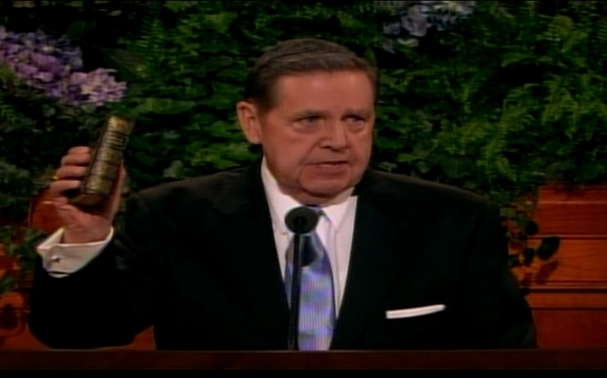
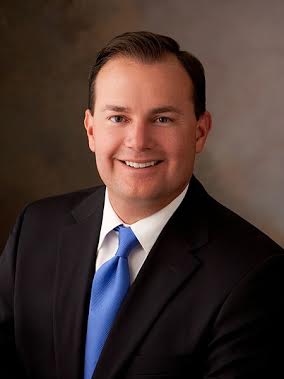
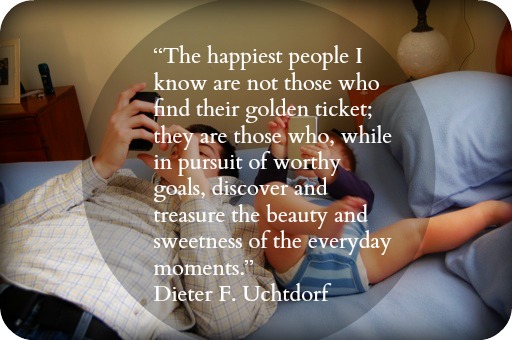
I am using that great quote-poster of Lincoln. Please let me know if that’s a problem.
God bless
Michael Brown
Spirit Daily